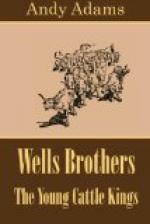The second morning out from the station, Priest bore off on a course that would land him well above the grove on the Beaver. He had never been over the range, and not wishing to waste a day with a loaded wagon, he angled away for the sand hills which formed the divide, sloping away to the branches of the main creek. Noon found him on the south fork; cattle were encountered near the juncture, and as he approached the grove, a horseman rode out as if to dispute the passage of an intruder. The old foreman noticed the boyish figure and delayed the meeting, reining in to critically examine cattle which he had branded some three months before. With diligent intent, the greeting was kept pending, the wayfarer riding away on a tangent and veering back on his general course, until Dell’s suspicion was aroused. The return of Priest was so unexpected that the boy’s eyes filled with tears, and the two rode along until the grove was reached, when they dismounted.
“If I had known that you were coming,” said Dell, “I could have made coffee here. It was so lonesome at the ranch that I was spending the day among the cattle.”
“A cowman expects to miss his dinner occasionally,” admitted Priest; “that’s why they all look so long and hungry. Where does that 7L steer range?”
“The big mottled fellow?—Why, down near the corral,” replied the boy, repeating and answering the question.
“I want to look him over,” simply said the old foreman.
The two remounted and continued down the valley. The noon hour had brought the herd in for its daily water, and no animal was overlooked on the homeward ride. The summer gloss had passed and the hairy, shaggy, winter coats of the cattle almost hid the brands, while three to six months’ rest on a perfect range was reflected in the splendid condition of the general herd.
“That’s one feature of the winter intrenchments that needn’t worry us,” said Priest; “the cattle have the tallow to withstand any ordinary winter.”
“And the horses are all rolling fat,” added Dell. “They range below the ranch; and there isn’t a cripple or sore back among them. There’s the mottled steer.”
They were nearing the last contingent of cattle. Priest gave the finished animal a single glance, and smiled. “Outsiders say,” said he, “that it’s a maxim among us Texans never to eat your own beef. The adage is worth transplanting. We’ll beef him. The lines of intrenchment are encouraging.”
The latter remarks were not fully understood by Dell, but on the arrival of the wagon that evening, and a short confidence between the brothers, the horizon cleared. Aside from the salt and barrels, there were sheepskin-lined coats and mittens, boots of heavy felting, flannels over and under, as if the boys were being outfitted for a polar expedition. “It may all come in handy,” said a fatherly voice, “and a soldier out on sentinel duty ought to be made comfortable. In holding cattle this winter, it’s part of the intrenchments.”




